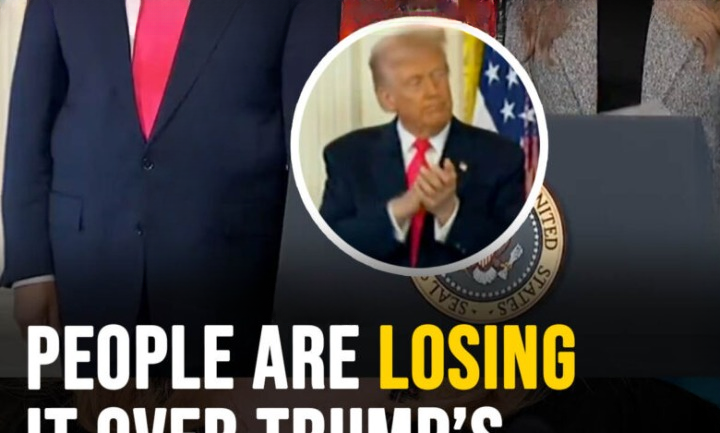The White House intended the event to be simple: President Donald Trump, alongside First Lady Melania Trump, would unveil a new executive order focused on reforming the nation’s foster care system. The moment was structured around Melania’s speech, which centered on a sobering truth — nearly 400,000 children are currently part of the U.S. foster network. Her remarks were meant to serve as the emotional core of the announcement, a call for lawmakers, nonprofits, and community leaders to act with urgency.
Her message built on her long-running “Be Best” campaign, now expanded into “Fostering the Future,” a program designed to provide foster youth with better access to education, mentorship, and career opportunities. She stressed that acknowledging the problem wasn’t enough. “Rise above the ease of inaction,” she urged, pushing institutions to take meaningful, compassionate steps forward.
When Trump spoke, he praised her initiative, calling it “vital,” and expressed enthusiasm for signing the executive order. He also highlighted the involvement of Second Lady Usha Vance, who played a key role in advocating for the program’s growth. Quoting scripture, he framed the issue as a moral responsibility: “The Bible tells us that one of the measures of any society is how it cares for vulnerable children and orphans.”
That should have been the headline. But within hours, the internet was buzzing about something entirely different: Trump’s expression during Melania’s speech.
Clips began circulating online showing him standing behind her, and viewers zoomed in on his eyes. Many claimed he looked as if he were struggling to stay awake. One person tweeted, “Despite standing, Trump seems to be having trouble keeping his eyes open while Melania speaks.” Another joked, “After ‘Sleepy Joe,’ we now have ‘Sleepy Donald.’”
Social media took off with slow-motion videos, screenshots, and jokes — a familiar pattern in which even tiny facial movements from political figures turn into full-blown commentary. The moment spread quickly, fueled by Trump’s long history of generating strong reactions online.
But it didn’t stop with his eyes. Another clip from the same event drew attention when viewers noticed his unusual one-armed clapping. Instead of a typical two-handed clap, Trump appeared to be doing most of the motion with a single arm. It was a small detail, but noticeable enough to spark another round of commentary.
“Look at Trump’s one-armed clapping,” someone wrote. Another piled on: “Forget drinking water normally — can he do ANYTHING normally?” Some wondered if there was a medical explanation.
Others pushed back, insisting that different people clap in different ways. One viewer joked, “It looks weird, but I just clapped to check… and I do it the same way.” Another added, “I’ve clapped like that for 50 years — should I be worried?”
So once again, a significant policy event was overshadowed by the online micro-analysis of body language — something almost inevitable in today’s political climate.
After the applause, Trump leaned over, kissed Melania on the cheek, and complimented her work. Then he used a familiar joke: “Our country is truly blessed to have this magnificent and very caring First Lady,” he said, adding that crowds often ask for Melania instead of him. “They love her. Every time I make a speech, they say, ‘We want our First Lady.’ I say, ‘What the hell — am I not good enough?’”
Those in the room chuckled lightly. The event then shifted back to policy matters — though online, the conversation was still dominated by memes, speculation, and arguments over whether the scrutiny was fair.
Ironically, the substance of the day was significant. The executive order aims to strengthen support systems for foster youth by promoting partnerships between government and private organizations, improving access to healthcare, education, and essential services. Melania’s message focused on the importance of long-term stability for children who age out of the system — an issue that affects hundreds of thousands of young Americans.
But politics doesn’t exist separately from the internet anymore. Every blink, gesture, and expression gets magnified and twisted into discourse. Supporters brushed off the viral clips. Critics saw them as symbolic. Casual viewers got swept up in the noise because that’s how online attention works — it amplifies whatever goes viral, not necessarily whatever’s meaningful.
Still, many people noted that Melania delivered her remarks with poise and clarity. Some even said they wished the focus had stayed on foster-care reform instead of drifting into yet another social-media sideshow.
Ultimately, the event became a mixture of both: a serious policy announcement tangled with viral commentary about the president’s demeanor.
Whether the day struck you as genuine policy progress or political theater likely depended on your perspective before you watched it. But one thing is undeniable: people paid attention. They reacted. They joked. And they turned a few fleeting moments into a national talking point — because that’s the era we live in.
